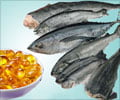Baked or boiled fish is a better source of heart-healthy omega-3 fatty acids than fried, salted or dried fish, according to a new study.
Baked or boiled fish is a better source of heart-healthy omega-3 fatty acids than fried, salted or dried fish, according to a new study.nd adding low-sodium soy sauce or tofu to boiled or baked fish, will further enhance the benefits.
"It appears that boiling or baking fish with low-sodium soy sauce (shoyu) and tofu is beneficial, while eating fried, salted or dried fish is not. In fact, these methods of preparation may contribute to your risk. We did not directly compare boiled or baked fish vs. fried fish, but one can tell from the (risk) ratios, boiled or baked fish is in the protective direction but not fried fish," said Dr. Lixin Meng at the University of Hawaii, lead researcher of the study.The findings also suggest that the cardioprotective benefits vary by gender and ethnicity - perhaps because of the preparation methods, genetic susceptibility or hormonal factors.
Many studies have suggested that eating omega-3 fatty acids reduces the risk of heart disease; however, little is known about which source is most beneficial.
In this study, researchers examined the source, type, amount and frequency of dietary omega-3 ingestion among gender and ethnic groups.
The study found that men who ate about 3.3 grams per day of omega-3 fatty acids had a 23 percent lower risk of cardiac death compared to those who ate 0.8 grams daily.
"Clearly, we are seeing that the higher the dietary omega-3 intake, the lower the risk of dying from heart disease among men," Meng said.
Advertisement
Meng said that for women, the omega-3 effect was cardioprotective at each level of consumption but not consistently significant. Salted and dried fish was a risk factor in women.
Advertisement
"Our findings can help educate people on how much fish to eat and how to cook it to prevent heart disease. Alternately, if it is verified that the interactions between fish consumption, risk factors and ethnicity are due to genetic susceptibility, the heart-disease prevention message can be personalized to ethnic groups, and future study could identify susceptibility at the genetic level," said Meng.
The study was presented at the American Heart Association's Scientific Sessions 2009.
Source-ANI
SRM















